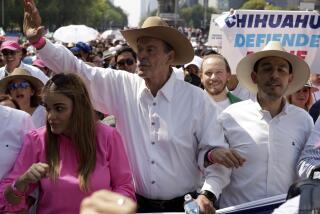Change in Egypt may lie with ruling party
This ancient city of congenial smiles is cranky.
Scuffles and the boots of riot police rattle through streets ahead of Sunday’s parliamentary elections that are not likely to ease public anger over President Hosni Mubarak’s squeaky, but powerful, political machine. There is no doubt the National Democratic Party will sweep to victory from the southern deserts to the Nile Delta.
Egypt is not known for cliffhangers. Limits on political freedom and three decades of emergency law have turned party challengers into mere annoyances. The secular opposition is calling for boycotts and the Muslim Brotherhood, which favors Sharia law and is the most potent counter to the NDP, has been hobbled by the arrests of hundreds of its members.
“We are talking about elections marred with bullying, hidden politics, dirty deals and many conflicting interests,” said Mohamed Salama Awad, a Cairo businessman. “Many independent candidates, not just the NDP, are to be blamed for such mayhem. Most of them want to join the parliament to serve their personal interests.”
Just a few months ago many Egyptians were daring to be optimistic about prospects for change. They were swooning over Mohamed ElBaradei, Nobel Peace Prize winner and former head of the U.N. nuclear regulatory agency, who had returned home to lead a protest movement. That early promise fizzled against infighting, divided agendas and a government crackdown on the media and opposition voices.
“It often appears as if ElBaradei imagined his mission to be easier than it turned out,” said Ahmed el Sawi, a columnist for the newspaper Al Masry Al Youm. “Realizing just how much effort political reform would require, he limited his activism to occasional messages on Twitter every few days as well as statements to foreign media outlets that remain enthralled by his performance yet unaware of the gap between him and the people.”
What followed have been headlines of unrest, accusations of government fraud and bribery, and attempts by police and thugs to intimidate independent candidates. The U.S., which gives Egypt more than $1 billion a year, has urged Cairo to hold a transparent poll. The strain between the allies grew testier last week when Egypt criticized Washington’s call for international election observers.
But it is within the ruling party, not in the tear gas of street protests, where the intriguing power plays over Egypt’s future lie. The election campaigns have highlighted the widening divide between the party’s old guard and the emerging young businessmen and moguls connected to Mubarak’s son Gamal, a 47-year-old banker and NDP star many predict will succeed his father.
The organization denies any rifts. It has held conferences and spent bundles on advertisements to convince rag men and millionaires that party and country are strong and united. But the fact that 780 NPD candidates are running for 508 seats suggests, as one columnist put it, that the “battle has moved from ‘behind the scenes’ to the front lines.”
What’s at stake is who will emerge as the ruling party’s presidential candidate in 2011. There are questions over whether Mubarak, 82, whose ill health has led to palace rumors and national anxiety, will seek a sixth term. The old guard, which has close connections to the military and state security services and appears to have the edge in Sunday’s elections, is betting that a man who has been in power since 1981 will stay there.
“At this moment,” said Nabil Abdel Fattah, a political analyst, “those old leaders, who were brought up on the authoritarian Egyptian culture since the 1952 revolution, are still in control of the party and they are backing President Hosni Mubarak for next year’s presidential elections.”
But if Mubarak doesn’t run, the party’s old and new wings would squabble over a candidate. This could mark the end of an era in which the country’s leaders for the last 58 years — Mubarak, Anwar Sadat and Gamal Abdel Nasser — rose from the ranks of the armed forces. Many Egyptians would find it difficult to imagine a leader who did not have a closet full of medals, ribbons and swords.
It would lead to interesting scenarios concerning the military’s influence and the pace of economic reforms, which have improved growth but spurred inflation and labor strikes and kept millions in poverty. No matter which side might win, growing public anger may nudge the party to rehabilitate its image as a corrupt organization unable to improve schools and hospitals and aloof to anyone but the wealthy.
Sunday’s voting is a dress rehearsal for a more poignant drama. But Awad, the Cairo businessman, is neither inspired nor excited.
“There are so many harassments and violations that are already proving the elections will not be fair,” Awad said. “But that does not mean that I won’t vote. I have to do what I ought to do even if I know the results beforehand.”
Amro Hassan of The Times’ Cairo Bureau contributed to this report.
More to Read
Start your day right
Sign up for Essential California for news, features and recommendations from the L.A. Times and beyond in your inbox six days a week.
You may occasionally receive promotional content from the Los Angeles Times.







